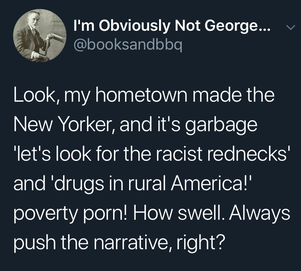|
Sam Burnham, Curator @C_SamBurnham  When Hurricane Florence slammed into the Carolinas late last week, it left the state’s inundated with water. Major flooding created caused serious damage and loss of life. The coastal city of Wilmington was cut off from the rest of the mainland by flooding. over 30 people have died in this storm, mostly in North Carolina and mostly from the flooding. One of my friends on Twitter pointed out a story in The New Yorker on his old hometown. I run into this publication a lot. It is one of those highly creditable publications. You know, the ones the big city people read and trust. But their coverage of The South is always predictable. You're probably never going to read a story about The South, especially small towns and rural areas, that isn't about racism. I guess that's what the the city folks want to read about, what the city sponsors what to fund, what the writers want to narrate. After all, that's the only thing going on in The South, right? Yes, the Klan used to come to Whiteville. Apparently they had a march there in 1997, just a few months before I met my wife. That hardly notable demonstration was three years before our oldest son was born. He reports for boot camp in a couple months. A grown man has happened since that march, that's how recent it was. The poet A.R. Ammons grew up in Whiteville and used the town and Columbus County in his poems. It's also the hometown of Ida Stephens Owens, the first black woman to receive a PhD in physiology from Duke. But yeah, the Klan used to march there. In this story, the subjects are standing in the road watching responders drive by. It is said that the help wasn't coming there, wasn't going to stop because its a black neighborhood. Having over 20 years of experience as a responder and having passed many people standing in or near the road in disaster situations, I can tell you, if they go riding by and you don't flag them down or aren't in immediate danger, they aren't going to stop, regardless of your race. They likely have a destination and unless you say "hey, I need some help" they are going to continue on their mission. With a population of about 5300, this town will not get the same response as Raleigh or Wilmington. Southerners of all races in small towns know they are behind the bigger cities. That's not just in times of disaster, that's on random Thursdays. We're always the low priority. But what bothers me most, is the fact that amid reports of over 30 deaths, houses with water up to the roof lines, photos of boats cruising down the interstates, a city completely cut off by floodwaters, the big story is racism. Donald Trump gets plenty of attention in this piece, as does the insinuation that anyone who voted for him is a racist. I probably just overlooked Charles Bethea's New Yorker article where he mentioned Barack Obama's disdain for the rural South and how he has yet to acknowledge the South Georgia tornadoes of 2016, much less respond to them. I'm sure I'll find it in his archives. I didn't vote for Donald Trump. I doubt I'll vote for him in 2020. But this is yet another instance that makes it so crystal clear to me why so many Southerners did and will again. The constant barrage of hit pieces that continue to shove the remnants of a long gone evil that plagued this land into the modern narrative. The South, particularly the rural South, is a grotesque pit of racism where there's a Klansman behind every tree posing a much greater threat than entire counties flooded out could ever muster. This one hits kind of close to home. My own hometown had a Klan rally a few years ago. About a dozen Klansmen from Michigan came to town and applied for a permit, which was granted as there were no legal reasons to deny it. Apparently we occasionally have to import Klansmen in Georgia now so carpetbaggers and scalawags will have something to write about. If you take anything from this article, understand that the Carolinas are in rough shape. Cities are flooded. Farms are flooded. White people are flooded. Black people are flooded. The storm didn’t discriminate. They need any prayers and resources you can spare. They're evidently not going to be getting them from The New Yorker.
0 Comments
Leave a Reply. |
Sam B.Historian, self-proclaimed gentleman, agrarian-at-heart, & curator extraordinaire Social MediaCategories
All
Archives
November 2022
|




 RSS Feed
RSS Feed
